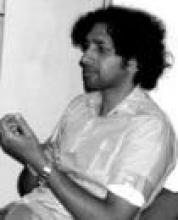Sumanth Gopinath is Assistant Professor of Music Theory at the University of Minnesota. Professor Gopinath researches in the areas of art, popular music, cultural theory, and globalization. He is currently at work on two book projects: one book focuses on race and ethnicity in Steve Reich’s music; and the other book project examines the ringtone industry.
Professor Gopinath participated in a roundtable discussion in Professor Carby’s graduate seminar “Transnational Imaginary” and delivered a public lecture titled “Trajectories of the Political Ringtone: Hugo Chavez and the Referendum of 2007.” Professor Gopinath’s lecture focused on the various ways that ringtones constitute a source for thinking and theorizing contemporary forms of political antagonism. In his lecture, Professor Gopinath noted that “the political ringtone, which in the form of national anthems and ethno-religious songs dates back to the earliest days of customizable ringtones, was profoundly transformed by the ringtone’s mutation into a sound file.
Recasting the cellular telephone as a portable music/sound playback and even recording device, the newest incarnation of the political ringtone has given rise to what might be understood as a global form: the political voice-remix ringtone. Originating in the Philippines in the summer of 2005 with the election scandal involving President Gloria Arroyo, in which the president’s voice was wiretapped while in conversation with an election official, successive attempts to utilize ringtones in this fashion began to appear in various parts of the world. One particularly important example was that of the “Por que no te callas?” phenomenon, whose source was the previous mentioned phrase (English: “Why don’t you shut up?”) uttered by King Juan Carlos I of Spain to Venezuelan President Hugo Chavez at the Ibero-American Summit in November 2007.
The incident immediately attracted widespread attention, both in the Spanish-language press and as a mass- cultural new-media phenomenon via YouTube and through ringtone remixes. Generating significant profits and amplifying fantasies of imperial nostalgia within Spain itself, the phrase and ringtone were quickly adopted by the white Creole elite youth in Venezuela, who constitute a core component of the Chavez administration’s opposition and played a significant role in the defeat of the proposed reforms in the December 2007 referendum.”
